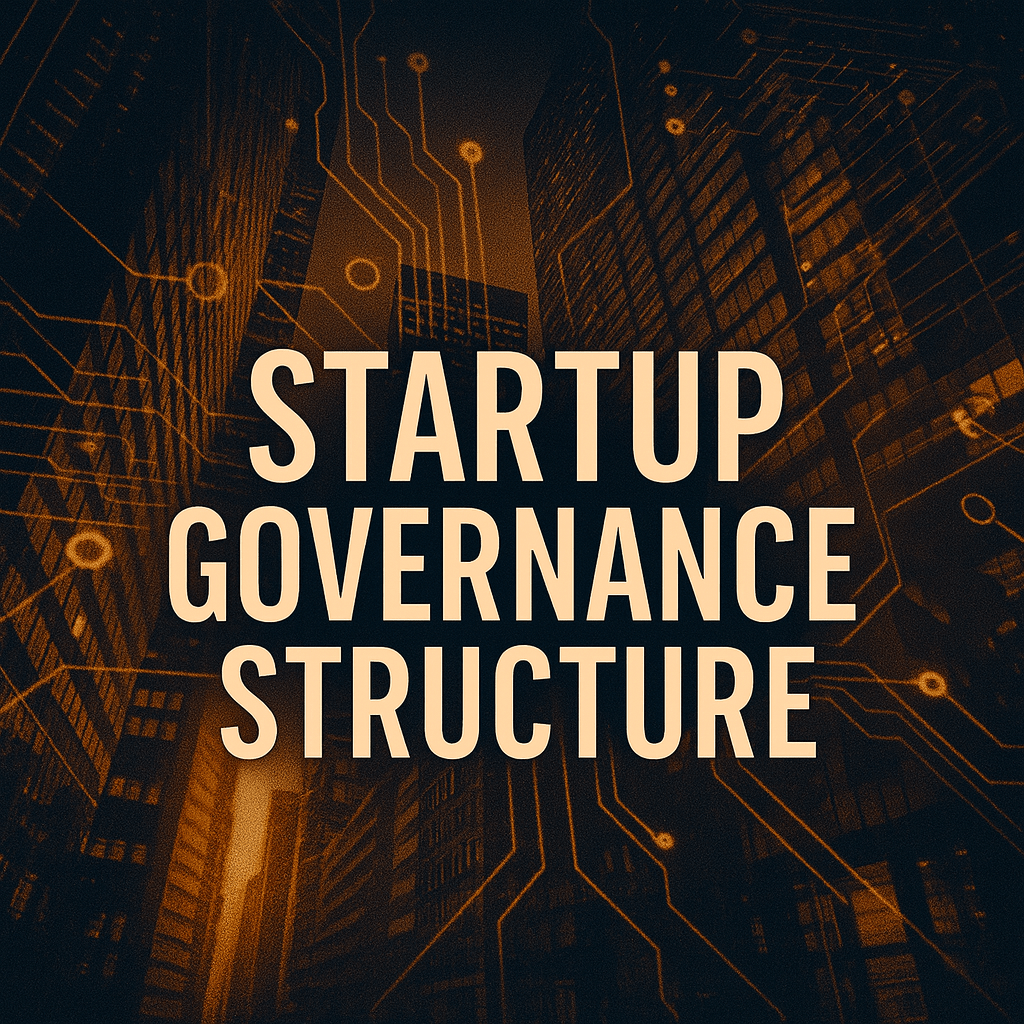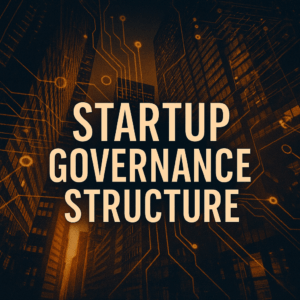In the rush of early-stage startup building—ideation, MVPs, marketing, fundraising—founders often overlook one of the most important components of long-term success: a clear and enforceable startup governance structure.
Governance isn’t just for big corporations or companies with VCs on the board. It starts on Day 1. When overlooked, even the most promising tech startups can find themselves paralyzed by co-founder disputes, decision deadlock, unclear equity rights, or a complete breakdown of accountability.
In this blog, we break down what a governance structure includes, why it matters from inception, and how it directly affects your legal, financial, and operational roadmap.
What Is a Startup Governance Structure?
A startup governance structure is the framework by which decisions are made, responsibilities are allocated, and conflicts are resolved within a company. It includes everything from:
- Board composition and authority
- Voting rights and thresholds
- Founder and shareholder agreements
- Operational decision-making protocols
- Equity vesting and control protections
This structure isn’t about creating bureaucracy. It’s about clarity, enforceability, and long-term protection for everyone involved—from the founders to the future investors.
Why Governance Matters—Even Before Investment
Many technology startup founders delay formalizing governance until they anticipate a funding round. That’s a mistake.
Governance isn’t just a tool for fundraising or cap table control—it’s a proactive safeguard against the very issues that prevent startups from ever reaching those milestones. The earlier you define roles, responsibilities, and decision-making processes, the better.
Here’s why startup governance structure is critical from the beginning:
- Co-founder clarity: Clearly defined roles prevent power struggles.
- Decision-making speed: Protocols prevent bottlenecks in key business pivots.
- IP and equity protection: Governance documents assign IP ownership and vest equity to avoid walkaway risks.
- Investor readiness: Clean governance signals that you’ve anticipated and controlled key risks.
- Exit alignment: Founder disagreements often derail exit or M&A talks—clear structure aligns expectations.
What Should Your Governance Structure Include?
For most early-stage startups, your governance framework should cover five foundational areas:
1. Board of Directors Setup
Even if you’re not yet required to have a formal board under your state law, establishing one (even a two-person founder board) clarifies oversight, authority, and fiduciary duty. Consider who appoints directors, how decisions are made (simple majority vs. unanimous consent), and whether investors will get board seats in the future.
2. Voting Rights and Thresholds
Who gets to vote on what? Equity-based voting is standard, but you can layer in protective provisions that require unanimous approval for critical matters like issuing new shares, amending the charter, or selling the company. A well-crafted voting protocol prevents one founder from unilaterally making major changes.
3. Founder Agreements and Vesting
This includes intellectual property (IP) assignment, non-competes, confidentiality, and—crucially—equity vesting. Founders should sign Founder Restricted Stock Agreements with reverse vesting over 4 years. That way, if a founder leaves early, they don’t walk away with full ownership.
4. Decision-Making Protocols
Your governance documents should define the categories of decisions that require board approval vs. those that can be made by the CEO or management. These should evolve over time, but establishing them early prevents costly misunderstandings about scope of authority.
5. Dispute Resolution Mechanisms
Governance isn’t just about when things go right—it’s also about planning for when they go wrong. Arbitration clauses, buy-sell agreements, and deadlock provisions can all help resolve conflicts without blowing up the company.
 How Governance Impacts Fundraising
How Governance Impacts Fundraising
When you start talking to angel investors or venture capital firms, one of the first things they’ll evaluate is your governance structure. Why? Because it shows whether your startup is legally mature enough to scale.
Common investor concerns include:
- Does a single founder control everything with 100% voting power?
- Are there conflicting board rights or ambiguous IP ownership?
- Have you anticipated what happens if a founder exits or disputes arise?
- Is the cap table clean, with properly authorized shares and signed agreements?
A governance vacuum at this stage is often a deal-killer—or at least results in expensive cleanup work that delays funding.
Even convertible note or SAFE investors expect a clear governance plan. After all, they’re betting that your startup will eventually raise a priced round, bring on a board, and execute complex decisions. A documented startup governance structure builds that confidence.
What Legal Documents Define Your Startup’s Governance?
To fully establish your governance structure, you’ll need several interlocking documents, customized to your startup’s state of incorporation and business model. These typically include:
- Certificate of Incorporation (Charter) – Defines share classes, board authority, and shareholder rights.
- Bylaws – Establish internal procedures like board meetings, officer roles, voting mechanics.
- Shareholder Agreements – Covers rights of first refusal, drag-along rights, and exit terms.
- Founder Agreements – Assign IP, set equity vesting schedules, and clarify roles.
- Board Consents / Meeting Minutes – Provide a paper trail for key decisions and approvals.
Working with a startup-focused attorney ensures these documents work in harmony and reflect the latest legal standards in your jurisdiction.
When Should You Formalize Governance?
The short answer: immediately after incorporation and before any external commitments. If your startup has:
- Two or more founders
- Plans to raise money
- A launched product or beta
- Employees, contractors, or IP development
- Conversations with investors or partners
… then it’s time. Don’t wait until a dispute arises or a term sheet forces you to act. Governance delayed is often governance dictated—by someone other than the founders.
Best Startup Governance Attorney
Startup founders often think governance structures are about giving up control. In reality, they’re about safeguarding the company from chaos, misalignment, and legal risk. The best time to implement a startup governance structure is before you think you need it—because by the time you know you need it, it’s usually too late.
If you’re starting a tech company, assembling a founding team, or preparing for your first funding round, it’s critical to set your governance foundation now. Schedule your confidential consultation with L.A. Tech and Media Law Firm or use our secure contact form.
David Nima Sharifi, Esq., founder of the L.A. Tech and Media Law Firm, is a nationally recognized IP and technology attorney with decades of experience in M&A transactions, startup structuring, and high-stakes intellectual property protection, focused on digital assets and tech innovation. Quoted in the Wall Street Journal and recognized among the Top 30 New Media and E-Commerce Attorneys by the Los Angeles Business Journal, David regularly advises founders, investors, and acquirers on the legal infrastructure of innovation.
Schedule your confidential consultation now by visiting L.A. Tech and Media Law Firm or using our secure contact form.



